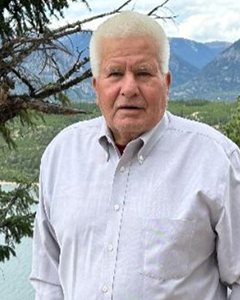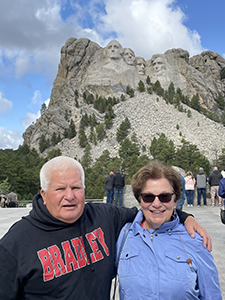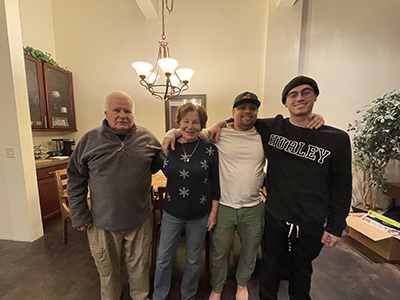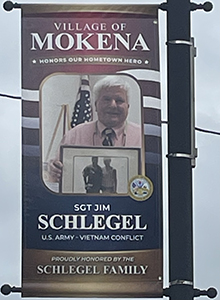Army Vietnam War Era Mokena, IL Flight date: 09/25/24
By Ginny Williamson, Honor Flight Chicago Veteran Interview Volunteer
“Big Jim” Schlegel grew up in the Mt. Greenwood area of Chicago. He went to Morgan Park High School and was a Boy Scout growing up. At Bradley University, he was a member of the TKE Fraternity, graduating in 1968 with an engineering degree. Jim served in the Army from September 23, 1968 to April 27, 1970.
Ever wonder how someone gets interested in or decides to sign up to serve? For Jim, he recalls hearing about Dr. Tom Dooley. Dr. Dooley was on board a ship that transported North Vietnamese Christians out of the area. He came back to the States and started a medical mission in Laos and North Vietnam. His ideas started the Peace Corps.
The Democratic National Convention, held in Chicago is 1968, also influenced Jim’s decision. Jim was in Chicago for Venetian Night while the DNC was happening, and saw all the conflict that was going on. It impacted him.
Jim was very intrigued with Dr. Dooley’s experiences and story and moved by the events at the DNC and made the decision to sign up for the draft in 1968. He went to the recruitment office and told the officer there that he wanted to be an officer. The officer’s response was, ‘You don’t tell us what do.’
Jim went off to basic training on September 23, 1968. He first went to Fort Campbell for two months of basic, and then moved on to Fort Sill for artillery training for another two months. Not a lot of training before getting deployed he thought. Jim remembers when he was issued his weapon after training, the instructor said, ‘I pray you make it.’
They lined up them up and told them where they would be going next. Only one other recruit who was with Jim at Fort Sill went with him to serve the whole time they were in Vietnam. As the two of them arrived, two others went back home. ‘That’s the way it was.’
In February 1969, Jim arrived at LZ Pony and was assigned to A Battery 7/15th Artillery. Jim was part of a unit that was responsible for shooting the big guns, the Howitzers. These guns – 175mm howitzers and two 8-inch howitzers with 200-pound shells – were capable of shooting up to 16 miles on a target the size of a garbage can. His officer asked the group who was good at mathematics. Jim raised his hand, knowing that he could put his engineering degree to use. Jim was assigned to FDC (Fire Direction Control).
Jim and his fellow soldiers in the FDC were always in contact with the guys in the field. The infantry would call in for support, giving the compass setting for the target and the approximate distance. Jim’s job was to pinpoint the compass readings on the maps that they had and look for the coordinates. Every 12 hours they needed to check the weather, as the wind would impact how they calculated the coordinates. They would have four targets set up and pre-planned at night.




Jim was in Vietnam for a total of 455 days. He said it takes the first 3 months to acclimate your body and get used to the terrain. The next 3 months, you’re starting to catch on. Then the next 3 months you get good at what you’re assigned to. And the next 3 months, all you’re doing is thinking about going home. Jim made Sergeant in November 1969. After reading many books on Vietnam and after discussions with other veterans, Jim came to realize that LZ Pony was like summer camp to what others had experienced.
Jim believes that draftees make the best soldiers. They had you doing menial tasks, like cleaning toilets, etc. He remembers, ‘This is just like a fraternity.’ College guys are used to doing these kind of things, when you all live together. If a soldier goes from high school straight to Vietnam, they are not used to doing these kind of things. In LZ Pony, Jim was usually in an underground bunker. He would go into the field to show the guys how to use the guns. It was ‘on the job training.’
The unit that Jim was assigned to, part of, had only 85 guys in it. They could really do what they wanted, as long as they did their jobs. The unit included Special Forces also who worked with the Vietnamese Regional Forces. Their Vietnamese translator was Sargeant Ton. They used the Vietnamese as laborers and had close relationships with them. Jim realizes that many of the veterans have a hate for the Vietnamese, but Jim had good relationships with them.
Jim said there were times that they had to fire in an area where US troops were. The troops were given warnings that the fire was coming in their area, to give them time to take cover. All the firing that was done was not so much about killing the enemy as it was about protecting our own group and troops.
If the LZ was being attacked, the siren would go off to let them know. For these attacks, Jim’s job was to look both ways, be the first in the bunker and make sure no hand grenades were thrown in. On one occasion, Jim fell down and saw an enemy in front of him. Jim had his gun on him, and believes it was only the Holy Spirit that saved him that day. One of his Vietnamese soldiers told him, ‘you just killed someone,’ and they wanted him to take a picture with the dead soldier. Jim hesitated, but they said he a known tormentor to the troops, the equivalent of the local tax collector.
On one occasion, Jim had the Honor of being the escort for Miss America, Judy Ann Ford while she and five other runner ups landed at LZ Pony. Judy Ann was also Miss Illinois and a graduate of University of Illinois. He found it hard to believe that they were allowed to come to a remote LZ with only 85 soldiers and Special Forces Team. Their visit meant a lot to Jim and all the servicemen there.
Jim returned to the States in 1971. For the most part, his experiences in Vietnam were positive. He does say, though, that after Vietnam, his whole life was dominated by his service in Vietnam.
When Jim returned home and arrived at O’Hare Airport, he said he walked off the plane with a big smile, waiting to be greeted by family and friends. However, he was shocked to find that no one was there to greet him. Needless to say, he felt very disappointed. He thought, ‘Fifteen months away from home and no greeting or ‘hero’s welcome.’’ A flight attendant noticed Jim and saw he had a sad look on his face. She grabbed his hand and said, ‘let’s get a Coke.’ A smile returned to Jim’s face as they proceeded down the hallway in the airport. They walked about 50 feet when Jim’s family and friends yelled, ‘Surprise!’ from behind the next waiting area. They had asked the flight attendant to help with their little surprise.
In 1976-1980, several years after Jim returned home, he sponsored a Vietnamese family – one of the ‘boat people’. He helped get the family set up here with six months of housing, food, etc. The family went on to buy their own home. The three children in the family all went on to graduate from college. Jim can only wonder what their lives would have been like had they stayed in Vietnam. The youngest boy in the family later grew up to become the first Vietnamese General in the US Army and served in Afghanistan.
Jim met his wife in 1986. He was on a skiing trip with his brother and family. While waiting in the airport, Jim started talking with a guy who was there with his wife and her girlfriends. Jim met Kathleen there, and later married.
Kathleen has a very strong connection to Vietnam. Two of her brothers served. Her older brother, Harry served in Germany for five years. When he learned that his younger brother was going to be deployed to Vietnam, he re-enlisted so that his younger brother did not go. At that time, they did not assign brothers. Harry served in 1968-1969 in Vietnam; he was a Ranger, and received a Bronze Star.
Harry’s younger brother was pursuing a degree in microbiology. After his basic training, he was deployed to Laos, to work in the medical department in the US Embassy. He would go out on secret missions to resupply the troops with medical supplies.
Jim said of Kathleen, ‘I don’t think she would have married me if I wasn’t a Vietnam vet.’
After returning from Vietnam, Jim worked for 51 years at Alco Spring and as a consultant for Barber Spring in the south suburbs of Chicago.
Jim is a member of Vietnam Veterans of Awareness, whose motto is, ‘We will never leave a generation behind.’ He is also a member of the VFW also.
Welcome aboard, Jim. Enjoy your day of honor. And thank you so very much for your years of service.


